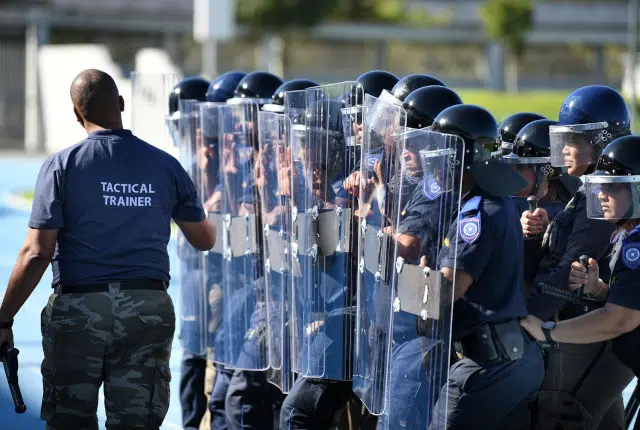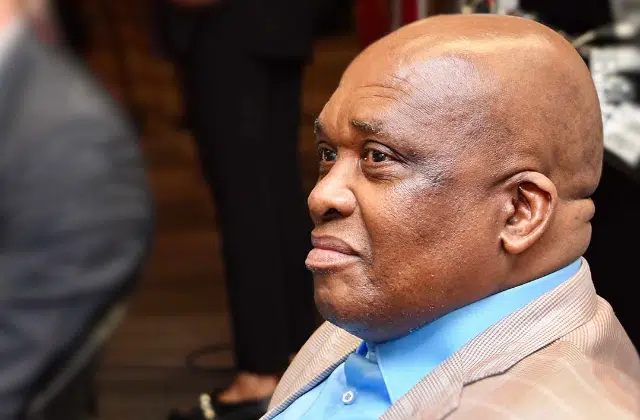
Cape Town wants its own fully fledged police force – with more powers
Cape Town mayor Geordin Hill-Lewis has laid out the city’s plans to boost its police force and extend its powers to investigate and convict criminals.
Speaking at the city council on Thursday (18 August), Hill-Lewis said that the national South African Police Service (SAPS) has a woeful conviction rate, and the national Department of Police – led by minister Bheki Cele – has left the province under-resourced to deal with crime.
“Lost dockets, lack of evidence and corrupt officials are staple features of SAPS investigations, which is why so many criminals still roam our streets, terrorising communities. These failures give the many hard-working SAPS officers a bad name and erode public trust in the police,” he said.
Between 1 April 2022 and 30 June 2022, a period of just three months, 198 cases serving before the court were withdrawn because of SAPS inefficiencies, he said.
“In Cape Town, we are faced with a double whammy: not only is there a failure of policing leadership at a national level; there is a chronic under-resourcing of the South African Police Services in this province and in this city.”
Hill-Lewis noted that, over the past five financial years, the Cele had decreased the number of SAPS officers allocated in 71% of the Western Cape’s police stations, adding that it has been left up to the city to pick up the slack.
He said that plans are already underway to build the city’s municipal police into a “proper crime-fighting force”, developing the policing power – through technology and boots on the ground – to make communities safer.
“Our officers are limited to crime prevention in the main, with limited scope for criminal investigations. While we already use that existing scope to the full, and we are fully confident in our power to do so, we also want to do so much more,” Hill-Lewis said.
“By going beyond crime prevention, we could be doing so much more to help SAPS build prosecution-ready case dockets. Instead, our officers have to rely on an overwhelmed and under-resourced SAPS that, frankly, does not have the capacity to investigate crime properly.”
Plans in places include:
- Training and deploying hundreds of additional law enforcement officers;
- Expanding neighbourhood watches,
- Fully harnessing technology to fight crime, and
- Fighting to expand municipal policing powers.
LEAP
As part of this new push for greater policing, the city said it has deployed 1,100 Law Enforcement Advancement Plan (LEAP) officers to communities impacted by high crime rates.
Through this, local law enforcement has more than tripled its arrest rate in recent years due to the increased city and provincial government investment, Hill-Lewi said.
“As of 31 July 2022, LEAP officers have made 8,500 arrests overall since the first deployment in February 2020. Of the 12 murder hotspots where LEAP officers have been deployed, four of them are no longer featured among the top 30 murder hotspots in the country,” he said.
More training and deployment
The city said it would increase training and deploy more officers to the areas that need it most, allocating R5.4 billion for its safety budget this year. It is funding 230 more officers and auxiliaries this year alone, with details of the deployment of 100 law enforcement officers to the Cape Town CBD coming soon.
In the coming months, the city will launch an 80-officer-strong facility protection unit to protect key municipal buildings from vandalism and staff from violent attacks.
“This new team are currently undergoing their training, and we wish them well and look forward to the difference they will make,” the mayor said.
In addition, the city’s traffic services will soon see the implementation of the city’s 24-hour Highway Patrol Unit, which will improve traffic service, reduce fatalities, and ensure that law and order is maintained on the roads.
Over the next three years, R66 million has been budgeted for expanding the city’s law enforcement training college to produce additional officers. This includes the recruitment of 25 additional training staff to deliver on the expanded training needs of the city’s police departments.
New technologies
Hill-Lewis said that plans are underway to convert the city’s current Transport Management Centre into a fully-integrated Joint Services Operations Centre or JSOC.
“To use a biological analogy, the JSOC will become the ‘head’ of our policing operation – it is where our entire crime-fighting apparatus will be run from,” he said.
“If the JSOC is to be the head, then the Emergency Police Incident Control or ‘EPIC’ software system will be the ‘brain’. EPIC will process data in real time to give our operational command team enhanced real-time situational awareness and enable us to respond decisively and immediately to incidents as they occur.”
Continuing the analogy, the mayor said that the various camera-based technologies including CCTV footage, remotely piloted and manned aircraft systems, automatic number-plate recognition technology, vehicle dash cams and body-worn cameras would be the ‘eyes’ of the operation.
These functions would be augmented by the ‘ears’ – a network of audio sensors that detect when a shot is fired, precisely where it is fired and even the type of firearm used.
“Gunshot location data will help our police officers to deploy resources to gun crime hotspots, react quickly to gun crime when it occurs, and to help with prosecuting those who commit gun crime,” he said.
Expanding powers
The final key intervention that the City of Cape Town wants to implement is getting the police ministry to delegate more policing powers to the municipality.
Hill-Lewis noted that Cele previously shot down the request, saying that he “cannot devolve power in the absence of a constitutional amendment”.
“This is nonsense. Section 99 of the Constitution provides that ‘a Cabinet member may assign any power or function…to a Municipal Council’. Accordingly, I have written to the minister to request that he uses his constitutionally-enshrined power to give us the policing powers we need,” he said.
“If Mr Cele will not fulfil his democratic mandate to make the people of Cape Town safer, then we certainly will.”
Read: South Africa getting thousands of new police officers this year: Ramaphosa



